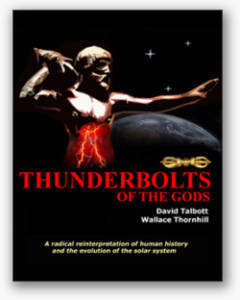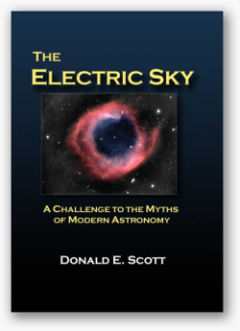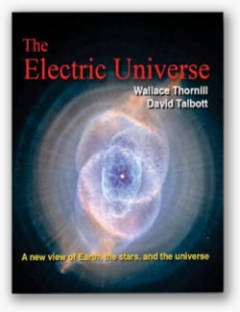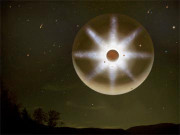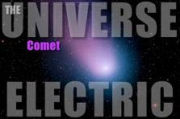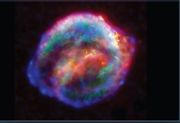|
|
|

"Water Lilies" flame fractal. Artist: Roger
Johnston
Big and Little Science
Apr
13, 2010
Professor Irving
Wolfe
What science produces is neither
universally true nor real, but is
created by the observer and is
relative to his predispositions and
equipment. As a result, it is not
complete but selected, not objective
but subjective, and not unique but
partial.
This produces an observer-created
reality, says physicist Roger Jones,
in which "the observer and observed
... cannot be broken down into
independent components" because "the
observer has an uncontrollable and
non-removable effect on what is
observed."
The result, according to physicist
Arthur March, is that "what is
perceived is....the effects brought
to light by this procedure," effects
which "are created by this process."
This means that the scientist each
time he observes creates something
new, for, as physicist John Wheeler
says, "this is a participatory
universe."
The scientific observation is
therefore less a picture of reality
than a sort of mirror in which the
observer sees himself, which makes
the physical world a product of
human consciousness. To physicist
Fred Wolf, when we look at the
universe "We are looking at
ourselves," and to Garry Zukav "we
cannot eliminate ourselves from the
picture....physics is the study of
the structure of consciousness."
"We can only see nature blurred by
the clouds of dust we ourselves
make," says physicist Sir James
Jeans, for whom for instance a
rainbow is not an independent object
up in the sky but a subjective
creation in the observer's mind:
"Each man's rainbow is a selection
from his own eyes ... from an
objective reality which is not a
rainbow at all."
The creation of scientific data is
therefore caused mainly by two
factors. The first is the equipment
used, which influences how the data
is created. As John Wheeler says,
"When we change the observing
equipment...We have...A phenomenon
that is new," and second, by the
pre-existent mental constructs of
the observer, which influence how
the data is interpreted. That is why
Jeans says that the attributes we
give to physical objects are "mere
articles of clothing...draped over
the mathematical symbols; they did
not belong to the world of reality."
To Einstein "Time and space are
modes by which we think and not
conditions in which we live."
Scientific theory is therefore
neither absolute nor correct, but a
compromise which "shows us something
about reality in the only way we can
get at reality."
Similarly, David Bohm speaks of
energy streaming from both the
observer and the observed. "The
phenomena are the result of the
intersection...from the same
reality," but it "has no clear
meaning" because what is unambiguous
is misleading and only "the
ambiguous is the reality." These
specialists insist that in science
the observer is omnipresent, which
led physicist and astronomer Arthur
Eddington to the astonishing
assertion that, in science, "the
mind has by its selective power
fitted the processes of Nature
into...a pattern largely of its own
choosing; and in the discovery of
this system of law the mind may be
regarded as regaining from Nature
that which the mind has put into
Nature."
Proof is therefore circular in
science, with events being
considered real only if they
correspond to what we already
believe. To Jeans the laws of
science "are a description, not of
nature, but of the human
questionings of nature," and they
"tell us nothing about nature, but
only something about our own mental
processes."
Similarly, physicist Heinz Pagels
asks, "Are theories 'out there'?"
and answers "I don't think so.
Theories are inventions," while
physicist Werner Heisenberg puts it
much more simply: "Science is made
by men."
In addition, scientific language,
whether mathematical or lexical,
suffers from the same defects, it is
not real but only a "symbolic means
of representing the world," "a
dangerous instrument to use," "a
symbol definable only in terms of
other symbols." Opinions about
reality therefore exist only in the
scientist's mind and "need not," in
Jean's words, "resemble the objects
in which they originate," and
therefore "it is no longer objective
nature itself but nature in relation
to the human observer that becomes
the material studied by physics."
On top of that, the scientific
report is also a fabrication, for it
does not describe what happened but
what should have happened and makes
no reference to feelings or trial
and error. To analysts Broad and
Wade the "scientific paper is as
stylized as a sonnet" and its
framework "is a fiction designed to
perpetuate a myth." It is also
socially conditioned, riddled with
personality and culturally relative,
which is why Schlegel says that
"science is altogether a human
activity," while Karl Popper adds
that in science "the authority of
truth is the authority of society."
All the steps in the process called
science are colored by the human
touch.
These insights led Einstein to the
belief that, with the exception of
the measurement of the speed of
light in a vacuum, every observation
is inescapably conditioned by the
observer's frame of reference. It
led Niels Bohr to his principle of
complementarity, (that no single
observation can contain all the
possible descriptions of a
phenomenon), and it led Werner
Heisenberg to his uncertainty
relation, which states that not all
the properties of a subatomic object
can be fully investigated by one
observation at the same time.
To these men scientific knowledge is
severely limited or created and
subjective, which led Eddington to
doubt the reality which science
creates. To him, what he calls the
"external world" is a human
artifact, a structure created as "an
answer to a particular problem," and
"We refuse to contemplate the awful
contingency that the external world,
after all our care in arriving at
it, might be disqualified by failing
to exist."
For these reasons both David Bohm
and Niels Bohr see the creation of
science as similar to the creation
of poetry, and Roger Jones insists
that, in science, "whatever it is
that we are describing, the human
mind cannot be parted from it."
What these men are saying is that,
surprisingly, human involvement is
the most influential tool of science
and we can therefore never know what
the world is like in itself apart
from us as observers. "Physics,"
says Eddington, "is a world
contemplated from within...What the
world might be deemed like if probed
in some supernatural manner by
appliances not furnished by itself
we do not profess to know." What is
left for science, therefore, is to
talk about what it sees. That is all
that science is.
Einstein believed that in today's
science "there is no ultimate
theory, no...ultimate fact about the
stuff the world is made of," there
is only talk, which is why Einstein
said that "physical concepts are
free creations of the human mind."
This was forcefully reiterated by
Harvard astrophysicist Bruce
Gregory, who said that in science
"What is real is what we regularly
talk about" and therefore "When we
create a new way of talking about
the world, we naturally create a new
world."
Physics is a conversation about
nature, says Gregory, or, as Bohr
put it, "It is wrong to think that
the task of physics is to find out
how nature is. Physics concerns only
what we can say about nature." I
close therefore with Schlegel's
provocative statement that "The
natural world is not so much a fixed
structure, waiting to be
symbolically reproduced in our
science, as it is a complex source
of experience which can be described
in various and alternative ways."
That is the best that the scientific
investigation of nature can achieve.
It can get no closer to reality than
that because in science, to use
Bohm's felicitous phrase, "the
observer is the observed." Science
can yield accurate phenomenological
data of the act of observation, but
has no tools with which to perceive
the ultimate reality that underlies
the phenomena, a reality of which,
to quote French physicist Bernard
d'Espagnat, science can get only
"fleeting reflections."
As physicist Fred Wolf put it, "the
whole universe comes into existence
whenever we observe it" and
therefore "we are the artists in the
game of the universe." More than
that, the universes which we create
depend not only upon our choices of
observation but also upon the order
in which we carry them out, and it
is therefore our choices and our
sequence of analysis which "create
the alternative possibilities as
realities."
To Wolf, as a result, scientific
"reality is a matter of choice" and
"the real is mainly determined by
thought...The world we live in
depends on the pictures of that
world we paint in our minds" and how
we paint it is determined by desire.
As Heinz Pagels puts it, "Human
intention influences the structure
of the physical world," which is not
a picture of the real, but a
creation deriving from our
interactions with it.
As a consequence, fundamental matter
becomes to us a fluid, varying,
imprecise, uncertain and
unmeasurable realm and we cannot
discover if there is anything more
graspable beneath. That is the only
kind of knowledge about the
fundamental universe available to us
with our present methods, and our
ultimate knowledge of any branch of
science turns out to be equally
imprecise and uncertain. In all of
its fields we have derived many
partial subjective truths but no
fundamental ones, nor is there the
prospect of any. There is nothing
but ignorance.
Excerpts from a speech given to the
1994 Velikovsky Symposium.
For the full text of Professor
Wolfe's speech, as well as those
delivered by other participants,
see:
http://www.mikamar.biz/symposium-papers.htm
|
|
|
|
|
|
|
|
|
YouTube video, first glimpses of Episode Two in the "Symbols of an Alien Sky"
series.
|
|
|
|
|
|
|
Three ebooks in the Universe Electric series are
now available. Consistently
praised for easily understandable text and exquisite graphics.
|
|
|
|
|
|
|
|
|
|
